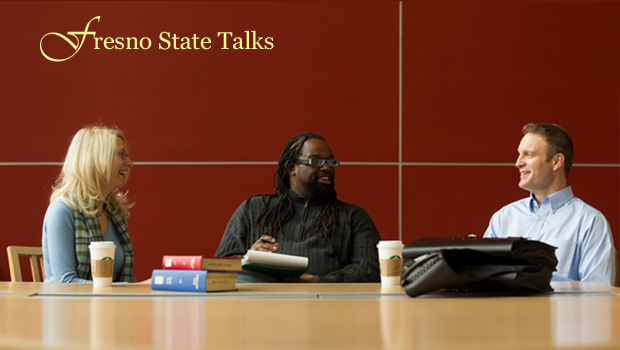Dr. Honora Chapman, director of the Smittcamp Family Honors College and coordinator in the Modern & Classical Languages and Literature Department, will kick off the Fresno State Talks Spring Lecture Series with a talk on the importance of self-discovery, 6 p.m. Feb. 21.
Fresno State Talks, which are free and open to the public in the Satellite Student Union (2485 E. San Ramon Ave), will begin at 6 p.m. with a reception following the lectures at 7 p.m.
Fresno State Talks is an innovative series of student-selected speakers that gives a TED Talks-like venue for three dynamic professors to bring their academic and personal experiences to a wide audience.
The Talks were created to showcase Fresno State and the individuals who teach, research and inspire on a day-to-day basis. Students nominate the speakers who are professors from a variety of disciplines.
The Talks series will continue with Dr. T. Hasan Johnson, professor in the Department of Africana Studies, on Feb. 26 discussing hip-hop culture and Dr. Wade Gilbert, professor of Kinesiology, on Mar. 5, who will speak on achieving greater distinction.
 Dr. Honora Chapman – Thursday, February 21st
Dr. Honora Chapman – Thursday, February 21st
Lecture Title: Eureka
Synopsis: Socrates asked his student Euthydemus whether he had seen the inscription at Delphi that read, “Know thyself (gnôthi sautón).” Following the lead of Socrates, I will encourage students to discover where their interests and strengths truly lie and then to pursue knowledge in their chosen fields with enthusiasm. By focusing on passion, achievement, courage, and engagement, students can reach new heights of success and discover themselves and their role in the wider community.
Bio: Honora Howell Chapman is Professor of Classics and Humanities, Coordinator of Classics, and Director of the Smittcamp Family Honors College at California State University, Fresno.
 Dr. T. Hasan Johnson – Tuesday, February 26th
Dr. T. Hasan Johnson – Tuesday, February 26th
Lecture Title: Hip-Hop…The #%$@ Remix!: Re-Evaluating Hip-Hop Culture’s Origins and Impacts
Synopsis: Although New York created the vocabulary for what is called Hip-Hop culture, it actually begins in multiple places. It develops parallel to New York, before, simultaneous to, and after its formal advent, only to later have its multi-streamed development subsumed into a neat, linear stream of continuity from New York to the world (even overlooking Fresno’s major contributions to Hip-Hop!). These unorganized activist/artists used public art (graffiti), non-structured dance (b-boying), expressive criticism (rap), and non-traditional modes of consuming media (DJing) to build a new global grassroots persona.
Bio: T. Hasan Johnson was born in Brooklyn, New York and raised in the San Jose Bay Area. Being an avid Hip-Hop fan, he was born with Hip-Hop, raised in Hip-Hop, and now teaches Hip-Hop. He holds degrees in
Africana Studies, Philosophy, Africa American Studies, and a doctorate in Cultural Studies. He publishes and writes on Hip-Hop, negotiating the links between the social, historical, political, economic, and religious linkages between Hip-Hop culture and Africana people’s lived experiences.
 Dr. Wade Gilbert – Tuesday, March 5th
Dr. Wade Gilbert – Tuesday, March 5th
Lecture Title: To Infinity and Beyond! Principles of Talent Development
Synopsis: Who doesn’t want to succeed – in business, in relationships, in sport, in music, in something? A comprehensive understanding of talent development requires a broad sweep across the scientific landscape. Sampling extensively from sport, education, business, psychology and medicine I have learned that talent development rests on three principles: (1) settings matter more than individual behavioral intentions, (2) individual needs are the spark that ignites the talent development fire, and (3) talent development requires high levels of personal mastery and shared vision. In this presentation I will take the audience on a talent development journey framed by these three principles. Audience members will leave with a better understanding of the science of talent development and how the three principles can be applied to their own quest for success.
Bio: Dr. Wade Gilbert is a professor and sport psychology coordinator in the Department of Kinesiology at California State University, Fresno. Dr. Gilbert’s areas of expertise include coaching science, talent development, sport and exercise psychology, physical education, and youth sport. Dr. Gilbert is the co-editor of the Handbook of Sports Coaching, and associate editor for the Journal of Sport Psychology in Action and the forthcoming International Sports Coaching Journal. An award-winning educator and scholar, Dr. Gilbert is regularly invited to share his expertise around the world for organizations such as the United Nations, the United States Olympic Committee, the International Council for Coaching Excellence, and the International Association for Sport and Physical Education in Higher Education. Wade has contributed to the design and provision of talent development systems for coaches and athletes in a wide range of sports and is a scientific advisor to BeLikeCoach, a national non-profit created to improve the quality of youth sport settings in the United States.
Related Links:




